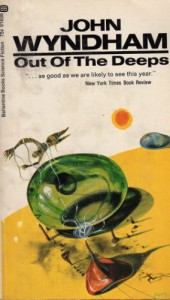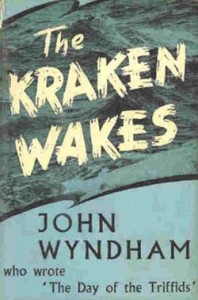By Bob Hicks
About the time the icebergs started breaking off I realized that Out of the Deeps, John Wyndham‘s 1953 speculative-fiction thriller, was heading into some pretty interesting territory. The suspicion had been rising for some time that this was no ordinary, dated genre toss-off. But when I picked it up I’d had no idea it anticipated the global warming controversy by a full 50 years.
 I did have an idea it’d be an interesting read, at the least from a historical and sociological perspective. Wyndham (full name John Wyndham Parkes Lucas Beynon Harris, born 1903, died 1969) was also the author of a novel called The Day of the Triffids, which I had never read but recalled vaguely as a pleasingly scary movie about an invasion of malevolent creatures from outer space. I happened upon Triffids on a shelf at Powell’s in a recent “rediscovered” edition, all tricked out in fresh literary wrap suggesting that someone at a publishing house somewhere thought it was worth a more serious look. It was selling for 16 bucks, and I wasn’t sure I wanted to put that much down for a gamble on an author I’d never read from a dubious pulp-genre background. But next to it was a used copy of Out of the Deeps for $2.50, and that, I decided, was worth the risk.
I did have an idea it’d be an interesting read, at the least from a historical and sociological perspective. Wyndham (full name John Wyndham Parkes Lucas Beynon Harris, born 1903, died 1969) was also the author of a novel called The Day of the Triffids, which I had never read but recalled vaguely as a pleasingly scary movie about an invasion of malevolent creatures from outer space. I happened upon Triffids on a shelf at Powell’s in a recent “rediscovered” edition, all tricked out in fresh literary wrap suggesting that someone at a publishing house somewhere thought it was worth a more serious look. It was selling for 16 bucks, and I wasn’t sure I wanted to put that much down for a gamble on an author I’d never read from a dubious pulp-genre background. But next to it was a used copy of Out of the Deeps for $2.50, and that, I decided, was worth the risk.
What I discovered was a sharp and often witty novel that was not about little green men (although something unfathomably alien and eventually aggressive has shot out of the sky and taken up residence in the depths of the oceans) but instead largely about people and the way they group into social structures and the unsettling habit they have of ignoring problems until it’s too late to deal with them without a whole lot of fuss. Don’t forget: Wyndham was writing only a few years after World War II, and the memory of massive national and international screwups was still fresh — as was the natural desire, after years of destruction, for nothing more than a little bit of peace and normalcy.
So. Vaguely gelatinous life-forms land in the oceans, and ships begin to disappear, and small villages on remote tropical islands end up suddenly devoid of people, with nothing but skid marks in the sand to show where something came out of the water and returned again.
 What’s the response? For a long time, pretty much nothing. People have a way of finding rational explanations for nonrational experiences — or, conversely, are irrationally incapable of expanding their world views to encompass experiences that fall outside of their ordinary patterns. Short-term concerns outrank long-term possibilities: If international shipping is curtailed because a few freighters have gone missing, the world economy could founder. Things happen slowly, until at some point you realize they’ve become tense and quick, and that’s one of the things I like best about this book. The point isn’t that Godzilla’s on the loose in Tokyo, smashing tall buildings to bits. It’s about how we, as social animals, adjust and respond to the slowly dawning realization that Godzilla might exist. In a way, Out of the Deeps is the story of the frog that gets stuck in a pot of gradually warming water and gets drowsier as the water heats up. Will the frog wake up and hop to safety before it’s boiled alive?
What’s the response? For a long time, pretty much nothing. People have a way of finding rational explanations for nonrational experiences — or, conversely, are irrationally incapable of expanding their world views to encompass experiences that fall outside of their ordinary patterns. Short-term concerns outrank long-term possibilities: If international shipping is curtailed because a few freighters have gone missing, the world economy could founder. Things happen slowly, until at some point you realize they’ve become tense and quick, and that’s one of the things I like best about this book. The point isn’t that Godzilla’s on the loose in Tokyo, smashing tall buildings to bits. It’s about how we, as social animals, adjust and respond to the slowly dawning realization that Godzilla might exist. In a way, Out of the Deeps is the story of the frog that gets stuck in a pot of gradually warming water and gets drowsier as the water heats up. Will the frog wake up and hop to safety before it’s boiled alive?
Wyndham creates three heroes, and although they’re really only sketches, they’re good ones. Mike Watson and his wife, Phyllis, are radio journalists for a British network that is not the BBC. They’re smart and ambitious, and they have both a nose for the unusual and the ability to put themselves in the right places at the right time. I feel like I’ve known these people. Wyndham writes with keen and skeptical observation about the ways that news organizations and power structures play each other’s games, alternately at odds and in collusion, and he shows a great feel for the conflicted ways that street-level journalists think about the flip-floppy balancing act they have to perform between truth and propaganda. The third hero is the scientist Bocker, who understands what’s going on way before anyone else and who unfortunately has an apocalyptic way of putting things that turns him into pretty much of a Cassandra.
The original British title of Out of the Deeps was The Kraken Wakes, and I like both titles. Kraken recalls the myth of the Norse sea monsters, rising from the deep and creating havoc. Out of the Deeps carries the suggestion of “out of our depth,” as in how well contemporary society is equipped to deal with massive and difficult to comprehend emergencies.
Such as, as it turns out, global warming. Was this simply a brilliant plot contrivance he came up to drive his action, or was Wyndham one of those long thinkers who anticipated possibilities that other people couldn’t imagine? Surely the science was beginning to coalesce, and he was both brave and shrewd enough to latch onto it. The book’s rarely seen monsters (whose way of thinking, Bocker points out, can’t be compared to our own because they’re fundamentally wired differently: are whales as “smart” as humans?) have figured out that in the battle for the planet, they will win if the planet’s land masses are inundated by their natural habitat, water. To that end, they use their technology to heat up the glacial ice packs in the Arctic and Antarctic, then wait for the inevitable results. Stated baldly, it sounds preposterous. Wyndham understood the interlocking nature of ecology (a word hardly known at the time, and never used in the book) well enough to make a plausible case for how such a natural breakdown would happen — and enough sense of human reasoning to make a plausible case for how we would react to it. Tea Partiers might like the paranoiac aspects of this novel and its sense that bureaucracies will tend to bungle things. They wouldn’t care much for its science.
Reading Out of the Deeps deepens some feelings I’ve been having about the world of literature. I miss the days of George Orwell and Aldous Huxley and big ideas in the literary world. Who thinks in big social terms now? John LeCarre, an acknowledged master who is nevertheless shunted somewhere off to the side of the party, over where Graham Greene is boxed in like a charming but slightly tipsy uncle so he won’t shock the debutantes around the punch bowl. Dan Brown, whose paranoid fantasies about Catholicism unfortunately wander into the ridiculous, and who, except for his adeptness at cliffhanging, can’t really write a lick. John Grisham, who layers melodrama over important legal and ethical questions and might be more honored in academic circles if only his literary style were a little less pedestrian. Colum McCann, who won a National Book Award for Let the Great World Spin, although his world is ultimately more an inner than an outer one. I’ll throw in a vote for Welsh-Canadian novelist Jo Walton, whose under-the-radar alternate-history trilogy about an England turned fascist and allied with Hitler (Farthing, Ha’penny, Half a Crown) is relegated to the fantasy aisles.
I bemoan the increasing fractionalization of the book business — every novel shoved into a preconceived corner with its own micro-defined potential audience and little chance to break out into general attention. Would The Catcher in the Rye be marketed today as a young-adult novel? Frankenstein and Gulliver’s Travels as science fiction? Animal Farm as kids’ lit?
Maybe it’s always been like this, at least to an extent. Wyndham seems in many ways a comfortable member of the H.G. Wells fraternity, and Wells is usually thought of as a fantasist first and a literary writer only as an afterthought. (So is J.R.R. Tolkien, with the added handicap of being pigeonholed as a children’s writer.) The first American edition of Out of the Deeps was published by Ballantine Books’ science fiction division, a pulp assembly line that knocked out 75-cent short novels with eye-grabbingly lurid covers. And science fiction fans certainly were the novel’s most ardent champions.
So maybe it’s genres themselves that we’re underselling — the idea that literary art can rise from any corner of the marketplace, and that maybe a crackerjack science fiction novel is worth more attention than yet another slightly amusing, Iowa Workshop-approved “literary” novel about a bad-boy college English prof with a rising libido and a drooping talent. Inner lives, the contemplative territory of the standard literary novel, are important. So are outer lives — how we engage one another as social, political, and economic beings, and what happens when mass social structures break down. Tolstoy and Dostoevesky addressed both. But if it’s one or the other, why is a novel of ideas less important than a novel of feelings?
Back to Out of the Deeps and Wyndham’s ability to assess the weaknesses and strengths of the social animal we know as human. This novel makes me think about possums and armadillos and why they end up as road kill. Nature armed the little waddlers with handy built-in defense mechanisms: when danger shows up, count on your armor or stop what you’re doing and pretend you’re not there. For several millennia that worked pretty well. But when the aliens — in this case, modern, technologically advanced humans — showed up with their internal combustion engines, the adaptations turned into a deep, deep problem.
Watch out for those tires. They’ll roll right over you.